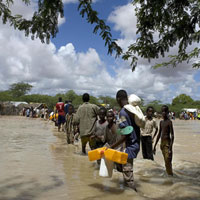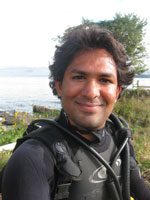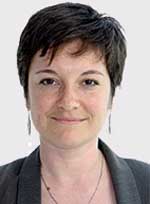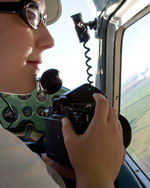EnviroThursday Fall 2016
Contact
Environmental StudiesOlin-Rice Science Center, Room 249 651-696-6274
esson@macalester.edu
instagram twitter
Presentations take place at 12 noon, Olin-Rice Room 250
September 21, 2016 – EnviroWednesday

7-8:30 pm Weyerhaeuser Boardroom
“Climate, Conflict and Migration: What are the Risks and How Should We Respond”
Speaker: Ms. Shiloh Fetzek, Senior Fellow for International Affairs, The Center for Climate and Security in Washington, DC
Shiloh Fetzek is also a Senior Research Associate for Environment, Climate Change and Security at International Alert in London. She holds a BA in Justice and Peace Studies from the University of St. Thomas and an MA in International Politics and Security Studies from the University of Bradford’s Peace Studies Department in the UK.
Sponsored by the Environmental Studies and Anthropology Departments.
September 29, 2016
No EnviroThursday – Check out the International Roundtable.
October 6, 2016
“Science Communication: How Do We Effectively Communicate Complex Science and Uncertainty to the Public?”
Speaker: Paul Huttner ’85, Chief Meteorologist for Minnesota Public Radio
Paul Huttner has worked TV and radio stations in Minneapolis, Chicago and Tucson. Paul is a graduate of Macalester College and holds a bachelor’s degree in geography. He has been awarded the Certified Broadcast Meteorologist (CBM) seal from the American Meteorological Society for excellence in broadcast meteorology. Paul also co-hosts Climate Cast on MPR, a weekly radio show on climate change science, news and solutions.
October 13, 2016
“A View from the Amazon: Ecosystem Services and Yawanawa Tribe”
Speakers: Dan Schibel ’96, Manager of Global Sustainability at the Aveda Corportation, and Sara and Thiago Yawanawa of the Yawanawa tribe from the upper reaches of the Amazon River in Brazil
Aveda sources its urukum, a source of red pigment, from the Yawanawa tribe. The presentation will discuss the concept of payment for ecosystem services and potential impacts. Sara and Thiago will discuss cultural practices, Yawanawa view of the environment, and impact of environment on their way of life.
October 20, 2016
No EnviroThursday – Fall Break
October 27, 2016

John B. Davis Lecture Hall, Campus Center
“Can Computers Help Us Understand Nature: Using Computational Methods to Link Empirical and Theoretical Approaches to Ecology”
Speaker: Ranjan Muthukrishnan, an ecological modeler, University Minnesota, Dept. of Fisheries, Wildlife, and Conservation Biology
In the light of large, continuing threats to ecosystems there is an ever growing need for understanding their dynamics and resilience to stresses. Ecologists have largely focused on two approaches to understanding natural systems: empirical observations of real systems and the development of theory about idealized systems. Each of these approaches has provided valuable insights but there has always been tension in efforts to integrate these perspectives. Empirical data is messy, contingent and often incomplete. Theoretical frameworks are filled with assumptions and often too rigid to reflect the complex realities and multi-causality of real systems. One strategy for a synthesis between these perspectives is the use of computational methods, which can potentially expand the range of inference from limited empirical data and help scale ecological theory to the levels of complexity in real ecosystems. Ranjan will offer two examples of efforts to integrate empirical data with theory to address ecological questions. Firstly, he will discuss the development and use of simulation models to understand critical tipping points in coral reef ecosystems. Secondly, he will present recent efforts to predict the risk of invasion by starry stonewort (Nitellopsis obtusa) in Minnesota lakes using large, publicly available datasets.
This EnviroThursday is co-sponsored by the Environmental Studies; Mathematics, Statistics, and Computer Science; and Biology Departments.
November 3, 2016

“From Climate Change Skepticism to Engagement: A Story of Human Needs”
Speaker: Irina Feygina, Director of Behavioral Science and Assessment at Climate Central
Applying a psychological lens to climate skepticism and disengagement reveals that these processes are rooted in deeply seated human needs to belong and to protect ourselves and our social systems, which can come into conflict with acknowledging and addressing climate change. This reveals important opportunities for overcoming skepticism and fostering engagement through addressing and harnessing these needs, and developing a toolbox of interventions that can be used in communication, program design and implementation, policy, organizational, and educational settings.
Irina Feygina, Ph.D., is a social psychologist who specializes in climate communication and the development and implementation of policy in domains of energy efficiency, clean technology adoption, environmental protection, sustainability, and climate change assessment and adaptation. She is the Director of Behavioral Science and Assessment at Climate Central, where she works on issues of science skepticism, climate attribution, and the use of social media in engaging the public and decision makers in recognizing and responding to climate change. Previously she served as Fellow on the White House Social and Behavioral Sciences Team, where she applied insights from behavioral science to improve program implementation across the federal government, and as a AAAS Congressional Fellow with Senator Michael Bennet (D-CO), working on the energy and environment portfolios. She received her Ph.D. from New York University, where her research focused on the role of motivated reasoning in climate change skepticism. In her work, Irina emphasizes incorporation of human needs and behavioral approaches into program design, communication strategies, and evidence-based policy and decision making.
This EnviroThursday is co-sponsored by the Environmental Studies Dept., the Psychology Dept., and the Institute for Global Citizenship.
November 10, 2016

“When the Landscape is Quiet Again: Documenting the Impacts of North Dakota’s Oil Booms”
Speaker: Sarah Christianson, Artist
Since 2012, Sarah Christianson has been documenting the legacy of oil booms and busts in her home state. In her most recent body of work “When the Landscape is Quiet Again”, Sarah investigates how the region is changing again today due to horizontal drilling and hydraulic fracturing. Sarah will speak about her work, her experiences photographing in the Bakken, and the impacts of this industry on the land.
This EnviroThursday is co-sponsored by the Environmental Studies and Art and Art History Departments.